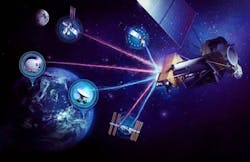Researchers ask industry to develop trusted computing and secure networking for land-to-space communications
KIRTLAND AIR FORCE BASE, N.M. – U.S. Air Force communications experts are asking industry to develop secure networking with cyber security for the U.S. Space Force for land-based deployment and space flight.
Officials of the U.S. Air Force Research Laboratory Space Vehicles Directorate at Kirtland Air Force Base, N.M., issued a request for information on Tuesday (RFI-RVKI-2024-RAPID) for the Rapid Architecture Prototyping and Integration Development (RAPID) for Trusted Network Device project.
Researchers are exploring cyber-secure internetworking capabilities for the U.S. Space Force that may require creating a secure resilient overlay network on existing networks.
To do this, researchers are asking industry to develop a trusted network device on a cyber-secure computer that will enable such an overlay network.
Related: The essentials of trusted computing and cyber security
The trusted computing networking device will enable user authentication, traffic flow authorization, encryption, packet switching, path selection, and traffic flow analysis protection at the overlay edge nodes. It also will connect disparate networks, traffic management, and performance monitoring.
The trusted network device for realistic testing for terrestrial deployment and space communications will offer secure boot, software signature verification, artifact storage, memory and process segregation, and remote attestation.
The trusted network device also will comply with U.S. military Zero Trust principles, including fail-secure requirements. It will be reprogrammable via software updates for the network control manager, software-based encryption, and user authorization, and in-band and out-of-band updates will be stored in the trusted computer.
Total traffic throughput for the experimental trusted network device should be 1 Gigabit per second with an objective of 100 gigabits per second. Network functions will be virtualized on top of the trusted computer, although researchers also are interested in virtualizing control while using custom hardware like application-specific integrated circuits (ASICs) and field-programmable gate arrays (FPGAs) for data switching.
The trusted network device will support dynamic network configuration and use switching and network control as needed to support as many as 16 traffic ports. The trusted network device should use to the greatest extent possible a modular open systems architecture (MOSA), provide open APIs for management and control, and reuse industry or government standards.
Companies interested should submit responses no later than 31 Jan. 2024 to the DOD Safe website at https://safe.apps.mil. Email Contracting Officer DeAnna Salazar at [email protected] by 26 Jan. 2024 for a DoD Safe drop-off request.
Email questions or concerns to the Air Force's DeAnna Salazar at [email protected]. More information is online at https://sam.gov/opp/4c782362acff4ae8a2dcf974a71dab87/view.
